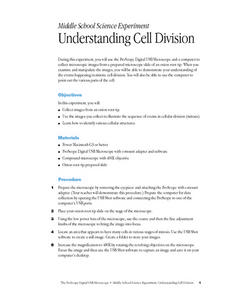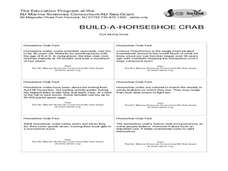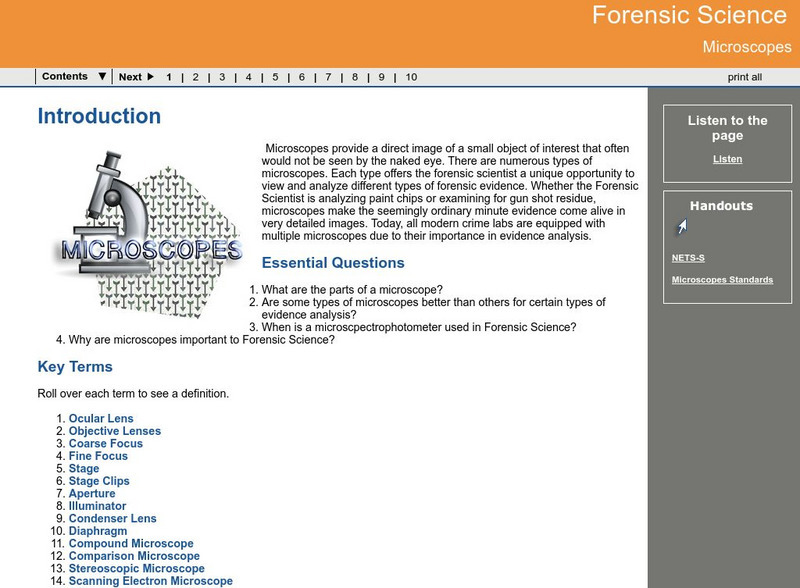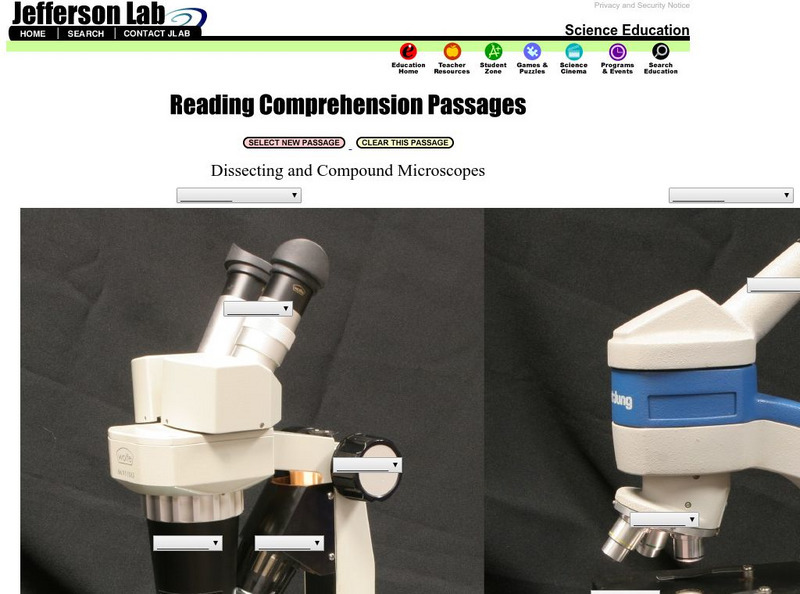Curated OER
Understanding Cell Division
Students collect and describe cells from an onion root tip which are undergoing the stages of cell division. They use a ProScope USB microscope to identify and compare cells in five phases of mitosis.
Curated OER
What Kind of Insect is That?
Fifth graders characterize insects and classify insects according to the Linnaean system. They use hand lenses or microscopes to examine insect body parts.
Curated OER
Build-A-Horseshoe Crab
Students discover many facts about horseshoe crabs. Students identify the main body parts of horseshoe crab. They explore the habits of the horseshoe crab and their importances to the ecosystem. Adaptations for younger students are...
Curated OER
Matter: All That "Stuff"
In this chemistry worksheet, students learn about matter, including atoms, electrons, protons, neutrons, compounds and chemical properties. They use this information to answer the 10 questions on the worksheet. The answers are on the...
Curated OER
Pollen Tube Growth
Students demonstrate the proper usage of the compound and dissecting microscopes. They identify the parts of a flower and the functions of the flower parts. Students describe the process of gamete formation and fertilization in a flower.
Curated OER
Mountain Pine Beetle
Students identify the different parts of a tree. In this biology lesson, students investigate how mountain pine beetles kill trees. They examine the beetles' anatomy using a microscope.
Curated OER
Creating Coacervates
Students create and observe coacervates. In this origin of life lesson, students create coacervates by mixing carbohydrate and protein solutions. They observe the life-like qualities of the structures and discuss the origin of life.
Curated OER
Dilution and Concentration of Solutions
Future chemists practice laboratory techniques by creating a monochloramine solution. The objectives are to use of dilution, 9concentration, and measurement skills and to prepare a solution that will be used in a water treatment...
California Academy of Science
Carbon Cycle Role Play
Anytime you make concepts clear with role playing or hands-on experience, it's a win for the whole class. Ping-Pong balls are used to represent carbon in a carbon cycle role-play activity. In small groups, children first discuss what...
Curated OER
Investigation of Meiosis in Common Plants and Animals
Students witness various stages of mitosis through preparing onion root tip slides. With teacher guidance, they learn a great deal through the hands-on process of preparing the slides themselves.
Curated OER
Polytene Chromosomes from Salivary Glands
Students use this laboratory procedure to outline the mechanism by which salivary glands are removed and prepared so that the polytene chromosomes may be observed.Drosophila virilis is used instead of Drosophila melanogaster because D....
Curated OER
Unit: Processing and Manufacturing: Examination Three
StudentsMatch the vocabulary terms in column A with the definitions in column B. Write the letter of the definition in column B in the space next to the terms in column A. Afterwhcich, students Write short answers or fill in the blank to...
Curated OER
Global Change- Earth as Home
Students create their own environment. For this environmental protection lesson, students pretend they are the owners of a tropical island. They create jobs for the citizens and develop the island as a model environment.
Curated OER
Barnacles: Harder than Cement
Fourth graders watch the movements of the complex animal hidden inside the tiny barnacle shells. This lesson allows students to study the behavior, adaptation, and larval stage of the barnacle.
Curated OER
Powdery Mildew Fungi: Classification and Ecology
Students use a written key or illustrated key to identify fungi on plant leaves into its genus based on sexual or asexual reproduction, host range diversity, and host-parasite relationships.
Science Struck
Science Struck: The Compound Microscope Parts and Its Functions
Goes through the different structural and optical parts of a compound microscope and how a compound microscope functions.
Science Struck
Science Struck: Compound Microscope: Basics, Functionality, and Uses
Explains what a compound microscope is, the different parts, how it works, and what it is used for.
Other
University of Delaware: Virtual Compound Microscope
This virtual microscope is ideal for learning how to properly use a microscope. Users can turn knobs and dials, throw switches, move levers, change lenses, select a specimen, and adjust oculars. Watch the seven minute video for an...
Georgia Department of Education
Ga Virtual Learning: Microscopes and Forensic Science
In this comprehensive interactive tutorial you will learn about the parts of a microscope and how some types of microscopes are better than others for certain types of evidence analysis within the field of Forensic Science. A...
Biology Corner
Biology Corner: Microscope Parts Quiz
This interactive diagram helps students memorize the parts of a light microscope.
PBS
Pbs Learning Media: Microscope Activity
Explore the parts of a compound microscope and view cells through this interactive lesson.
Science Struck
Science Struck: A Study of the Microscope and Its Functions
Uses illustrations with labels to complement a detailed examination of the parts and functions of a light microscope and an electron microscope.
Thomas Jefferson National Accelerator Facility
Jefferson Lab: Reading Passages: Disecting and Compound Microscopes
Read and fill in the blanks on these pictures of microscopes with the correct part names. Each blank has a dropdown menu with choices. When you finish, click CHECK MY ANSWERS. If you pick a wrong answer, the right answer will be...





















